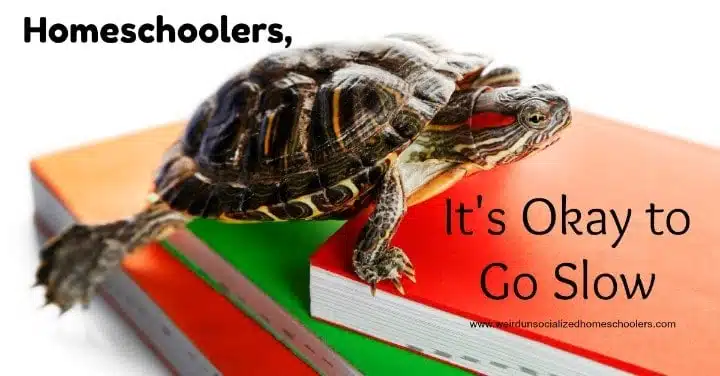Homeschoolers, It’s Okay to Go Slow
Homeschoolers are so smart, right? Smart—and ahead in everything. Sometimes. And we like those times when our kids appear bright and ahead of their peers because we think it proves that homeschooling works.
But sometimes homeschooling works because it allows kids to go slower and reach mastery of particular subjects or skills, instead of blindly plowing forward towards some arbitrary goal of finishing the curriculum “on time.”

My sons (nearing the end of 8th and 9th grade) probably impress folks with their wicked musical skills. Listen carefully and you’ll hear them toss out an, I just finished up a college level abnormal psychology/history/science course. And when my boys talk about how they will be able to start working on their AA degrees—as 11th graders—through Minnesota’s PSEO program? That’s when we get those looks that say, wow. Homeschooling works.
But y’all? I’ve got a confession to make. More than halfway through 9th grade, my oldest is just now picking up the books to dive into the world of Algebra 1.
What is “behind”?
When I was in school, starting algebra halfway through 9th-grade wouldn’t have been considered too far “behind.” Back in my day, you started algebra as a freshman in high school. However, a survey of local peeps tells me that algebra is now (at the latest) an 8th-grade class. So technically, if we were in public school, my son would be a year and a half “behind.”
I remember my mom telling me that when she was in school, the Dick and Jane books were something you got into as a 1st grader. (A kindergartner if you were really ahead!) Nowadays, if someone can’t read Dick and Jane by the time they’re in 1st grade, we’ve got red flags and individual help and talks with parents.
Something I often wonder about is this: are kids changing, or is it our education system that’s changing? Kids are kids are kids. And here is my gut feeling—maybe it’s schools that are ahead, not kids who are behind.
I mean, will Algebra 1 be a 5th-grade class someday? And I don’t mean introducing “concepts of algebra,” I mean the actual let’s-do-algebra-now class. And when that happens, will we be telling a whole bunch of kids they’re behind?
Our story of getting okay with moving slowly
Math has always been our struggle. And while we love our math curriculum, choosing the right curriculum doesn’t mean you somehow have immediate mastery of all concepts as they are explained.
(That’s worth re-reading: The right curriculum is the one that helps your kid understand and speaks to them in a way they can digest. It does not guarantee that your kid is going to go fast.)
[clickToTweet tweet=”The right curriculum is the one that helps your kid understand and speaks to them in a way they can digest. It does not guarantee that your kid is going to go fast. ” quote=”The right curriculum is the one that helps your kid understand and speaks to them in a way they can digest. It does not guarantee that your kid is going to go fast.”]
I remember being so frustrated that things weren’t just clicking with my kids. I remember feeling anxiety because although they were super independent in so many areas, they were not in math. They needed so many explanations and so much time.
There were two ways I chose to deal with this. The first—which, pro tip for you all, was the wrong way to approach it—was getting angry, frustrated, and thinking there was something wrong with my kids for not immediately latching on and going full speed ahead in their understanding. I threw the book at them and said, “You’ll figure it out!”
Spoiler alert: They didn’t—and not for lack of effort. And in my quest to make my kids independent learners in math, I actually sent them further behind.
The second way to deal with it (winner, winner, chicken dinner) was to take a step back and realize that as a homeschooling parent, I had the ability and opportunity to give my kids the extra assistance they needed. People pay for tutors, y’all. People need extra help. That’s a real thing. Math was a topic my kids needed extra help in.
So math became the subject that I sat down with them and worked through everything with them.
Everything. Y’all, I was heading back to the nightmare of my freshman year of high school and wading through the murky mess that is algebra.
And two things happened.
The first being that I realized that the second time through, going slower, I started to understand algebra. Totally. Every time I could solve one of those algebra problems without looking in the back for answers? I felt like a rock star.
I can do algebra now.
But more importantly, my kids understand it. And not only that, but they know they have someone in their court to give them a boost when needed. They know it’s okay to be really proficient in certain subjects and really struggle with others.
They know a) there is nothing wrong with them and their difficulties with the subject or skill, and, b) in their effort to understand, they have someone who will help them.
Providing extra assistance to your kids is not hand holding, and there is a big difference between letting your kids struggle through a formula and totally abandoning them to frustration and failure. People pay for that one-on-one help. It’s okay to give that extra attention and time and assistance when it’s needed. It’s okay. And I’m telling you that because maybe you need to hear it. (I know I did.)
When we move from a math concept now, it’s because my kids understand it. When we’re working on a new concept and they struggle, we slow down. Remember, homeschooling isn’t about putting a check mark in a box at a certain time or being a slave to the almighty lesson plan. It’s not about finishing a book/subject/unit by a certain time.
Homeschooling is about understanding what you’re learning.

If you’re stressed that about your homeschoolers being behind…
Reflect on the reasons you decided to homeschool. A common one is the ability to fit your child’s educational experience to your actual child. You wanted to be able to go at the pace that suited your kid. And sometimes, yes, that means plowing ahead.
Sometimes learning is faster simply because you’re rid of public school busy work and aren’t having to deal with 27 kids at once. But other times it’s not because you’re crawling like a turtle. And if it means you’re helping your child to understand something, crawling like a turtle is perfectly okay.
Think about yourself in school. What subjects/concepts did you struggle with? Did it hinder you in your life as an adult? Was it something you could not remedy? (9.9 times out of 10, the answer is no.)
Thinking even deeper into that, what are some things that would have helped you with the subject you struggled with? Hint: sometimes we just need more time and someone who is willing to guide us until we reach that understanding.
The great thing about homeschooling? You can be that person and take that extra time your kid needs.
Admitting we’re not on track
I get it. Homeschooled kids are supposed to be the ones who win spelling bees and graduate early. So I understand our hesitation to shout from the public school rooftops that our kids might not be “on track” in certain subjects according to where the public school thinks they are supposed to be.
I know there are anti-homeschool people who would take that information out of context and run to the ends of the earth with it. (Cough—regardless of the fact that just because the local PS says that 8th graders do algebra does not mean that all 8th graders are proficient in algebra—cough.)
But within the homeschooling community, why are we not more forthcoming with the information that our kids may be going slower? And not only slower, but might be struggling with some concepts and need more time to make it click?
We jump on the opportunity to brag on our kids about being ahead or even different in certain ways. But “behind”? “Struggling”? I very rarely see people having open, honest conversations about this.
Ahead? Behind? It really doesn’t matter.
Homeschooling sometimes means we go faster and we finish early for the year. Other times, it means we slow down and take much longer than other people.
It’s okay. It’s perfectly okay to let our child’s education fit the actual children we have. I mean, wasn’t that kind of the whole point of choosing to homeschool?
In what areas would your kids benefit from slowing down?






Thank you for writing this! This speaks directly to our current situation. My 8th grader is using Principles of Mathematics book one by Katherine Loop and is loving it. He has asked to continue with book two next year which is pre-algebra. That means he won’t start Algebra 1 until 10th grade and I had been stressing about that. You just freed me!
Thank you so much fir this article. It comes at a time that i really needed to remind myself why we homeschool. My son is 5th grade and struggling immensely with in math specifically multiplication facts so therefore we’ve had to really slow down his math and I’ve really had to be researching different math approaches to find something that will click for him. We are so very blessed to be able to homeschool and work where he needs to. If he were in public school I’m sure he wouldve been left behind.
Amy I am in the same boat right now. 5th grade son with multiplication problems. After talking to a ps teacher friend at church, I feel much better. She told me that this is completely normal. 60% of her 5th grade class is doing remedial multiplication worksheets for homework. 5th grade is when the student has to put together all of the functions he/she has learned from the past 4 years. This is the year that you see what isn’t developed strongly. Some kids its addition/subtraction, but for most its multiplication. The children struggling were able in previous years to work around their weak multiplication skills, however with the higher demands of 5th grade, they are no longer fast enough to keep up. We are taking month maybe two off of our curriculum to drill multiplication. Then we will try again. Best wishes to you and your son. Hang in there : )
Thank you so much for letting me know this. I didn’t realize those stats were so high and that it was a problem for so may kids in general. We, too, are taking time off and trying to cement those multiplication facts before moving on. Best wishes for you and your son!
Meghan, it sounds like a great idea to take a good chunk of time away from the curriculum. My youngest is in grade 7 ( Canada speak for 7th grade😃) and by last September really had still not gotten comfortable with multiplication in the way my older kids did … same materials, different person … so we took from September to January to just relax with numbers and work on number facts in a more concentrated but fun way. What worked wonderfully for us were the Usborne Books Multiplication activity books and pad. I actually ended up getting Fractions plus Math Puzzles and Number Puzzles since they were working so well. They are so much more engaging than drill sheets I had and she was always working to solve a problem related to the mazes, etc. We are now back to the curriculum. Yes, we’re behind where we were as far as the page number of the book but I’m not concerned about that. As I appreciated so much in this post, it’s about her own learning and pace, not “keeping up” to whatever current standard has been decided upon.
Math. Oh Algebra….if I could choke you, I would! LOL. We just started over in Algebra 1 mid-year. We left a popular DVD curriculum and moved to another, lesser known one that is working great for us. Just wish I’d started with it last year. 9th grade has been tough…with several stutters and stopping. Looks like we’ll be schooling year around because we are not “keeping up” with the “schedule.” Deep sigh…..
Thank you so much for this article. I have been stressed about the same situation. We had planned to zoom through Pre algebra and start Algebra 1 in 8th grade. But as we started, I knew we had to slow down for my son to grasp things. Right now, we will finish only by the end of this academic year. I was really stressed out that he is behind. What a relief after reading this article! Now I can peacefully finish the pre algebra and start algebra 1 next year. Thank you again for this article.
I am a public school teacher-8th grade English. In my district, algebra is offered as a pre ap class in 8th grade. Homeschool parents are doing things right when they give students time to actually learn and master a subject. Public schools are concerned with jumping from one thing to another quickly, as if every student learns in the same way, if they learn at all. I am sending kids on to high school who probably can’t tell me the eight parts of speech, write coherent paragraphs, or tell me when and how to use a semicolon. I already know that trying to get students to sit still and read for ten minutes for pleasure is “boring,” “stupid,” and a “waste of time.”
Do I like this? Not at all. That’s why I am retiring early-at the end of the school year. Everything is programmed so as to collect data. Data dictates everything. A student doesn’t need the ability to read, write, and communicate with ease, only the ability to answer multiple choice questions the right way. There are so many frightening things going on in public schools! Parents truly have no idea. My district is about to sink 300k into yet another expensive program.
So, my point is to say to homeschoolers-Keep up the good work! Your children are far and away better educated, better cared for, and more intelligent than many students that public schools turn out. Take your time, master concepts. Every child is different. How do I know? My daughter in law homeschools my grandson full time. My daughter has homeschooled as well.
Wow! That’s so sad. Thank you for your perspective and your words of encouragement!
Thank you for bringing this discussion into the light!
Again, thank you. We struggle all the time, especially with math. Several homeschooling mommies I know still like to talk about how ahead they are. It’s a struggle with parents/grandparents too who still think we didn’t make the right decision. Thank you, thank you.
I sooooo needed to read this to encourage me and my daughter. Math struggles over here too!!! But thank you for these words!